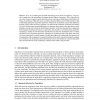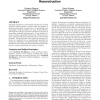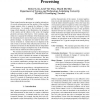93 search results - page 17 / 19 » Using conflict theory to model complex societal interactions |
101
click to vote
ESAW
2004
Springer
15 years 7 months ago
2004
Springer
Abstract. If we are to enable agents to handle increasingly greater levels of complexity, it is necessary to equip them with mechanisms that support greater degrees of autonomy. Th...
106
click to vote
GECCO
2006
Springer
15 years 5 months ago
2006
Springer
This paper introduces a novel analogy with the way in which honeybee colonies operate in order to solve the problem of sparse and quasi dense reconstruction. To successfully solve...
135
click to vote
ATAL
2008
Springer
15 years 3 months ago
2008
Springer
The beliefs of an agent reflecting her subjective view of the world constitute one of the main components of a BDI agent. In order to incorporate new information coming from other...
126
click to vote
BMCBI
2011
14 years 8 months ago
2011
Background: When investigating covariate interactions and group associations with standard regression analyses, the relationship between the response variable and exposure may be ...
149
click to vote
IMAGING
2003
15 years 3 months ago
2003
Many image formation processes are complex interactions of several sub-processes and the analysis of the resulting images requires often to separate the influence of these sub-pr...



